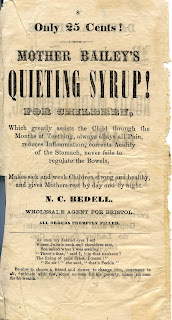Note: This is a cross-posting from Paul Holmquist’s “Bringing The Moonstone To The Stage” blog, chronicling research and process for our winter MainStage production of The Moonstone. This post is by Maren Robinson, our production dramaturg.
Opium Eating and The Moonstone
 The use of opium is featured in several of novels by Wilkie Collins including The Moonstone. Collins was also a user of opium both in laudanum and injections. It is important however to understand that opium was widely used in England at this time as a medicinal remedy. Although Doctors and chemists widely disagreed about both its uses and it the physiological response to the drug it was accepted for use in the home and was not considered a source of shame or moral failing or addiction as an illness in the same way as modern drug use.
The use of opium is featured in several of novels by Wilkie Collins including The Moonstone. Collins was also a user of opium both in laudanum and injections. It is important however to understand that opium was widely used in England at this time as a medicinal remedy. Although Doctors and chemists widely disagreed about both its uses and it the physiological response to the drug it was accepted for use in the home and was not considered a source of shame or moral failing or addiction as an illness in the same way as modern drug use.Opium is used in a variety of forms all of which are derived from the sticky white juice taken from the opium poppy. It can be prepared in a variety of forms. During the time period it was smoked in pipes, and injected as morphine but most often it was prepared in a brownish/red liquid tincture in alcohol known as laudanum.

Laudanum was widely available and inexpensive in chemist shops in even the smallest English villages. It was commonly given to sooth fussy children and infants. It was sold under a wide variety of names including: Batley’s Sedative Solution, Dalby’s Carminative, Godfrey’s Cordial, McMunn’s Elixir, and Mother Bailey’s Quieting Syrup for which an advertisement is pictured at left. It was given as a tonic or cure a wide range of illnesses including colds, cholera, hay fever, insomnia, tuberculosis, nervousness, headaches, gout and rheumatism.
In Opium and the Romantic Imagination, Alethea Hayter says that,”Laudanum was cheaper than beer or gin, cheap enough for even the lowest-paid worker.” Further in the same work, a chemist in a small Lancashire parish is cited as selling 200 pound of opium per year and a chemist in Thorpe is described as telling Coleride he sold two to three pounds of opium and a gallon of laudanum every market day.
Wilkie Collins saw his father taking “Bately’s Drops” to ease the pain of heart disease before his death. When Collins began to suffer symptoms of rheumatism and gout as well as eye pain he began taking laudanum to ease the pain. He would be a lifelong user of laudanum. As his tolerance for the opiate increased so did his dosages. Late in life Collins was taking doses that would have killed a normal person. At a dinner party, he apparently asked the surgeon Sir William Fergusson to verify his claim and Fergusson told the dinner party that the amount of laudanum Collins took nightly was sufficient to kill every man at the dinner table.  Collins also received occasional injections of morphine for pain.
Collins also received occasional injections of morphine for pain.
Collins seems to have both resented and romanticized his need for laudanum. He claimed he took laudanum “To stimulate the brain and steady the nerves,” but he advised his friend Hall Caine against taking it himself. He felt he needed it to bear the pain he suffered but he was also aware of the associations laudanum had with numerous writers. Thomas De Quincey’s Confessions of an English Opium-Eater was published in 1821. The use of opium by authors such as Samuel Taylor Coleridge and Charles Baudelaire was also well-known.
Walter Scott claimed to have written part of The Bride of Lammermoor (a novel particularly admired by Collins) while he was under the influence so that when he read it he did not recognize the story as his own. Collins may have remembered this story when he told a similar story about writing The Moonstone. Collins claimed that his pain was so great that he had to dictate the story and that he went through several secretaries before he found one who would ignore his cries of pain. It is clear from the manuscript that some of the pages are written in a different hand. Collins also claimed that he was “pleased and astonished” by the end of The Moonstone but did not recognize it as his own work.
“If I had only myself to think of, I should prefer the sharp pain to the frightful dreams.” – Ezra Jennings, The Moonstone
The character of Doctor Candy’s assistant, Ezra Jennings, in The Moonstone is also an opium user many critics have seen him as the voice of Collins speaking when he describes the effects of the opium that keeps him from pain but gives him terrible nightmares. Collins did not describe nightmares as part of the effects of his laudanum use but he did describe waking hallucinations including the feeling that someone was standing behind him, ghosts on the staircase who wanted to push him down and a green woman with tusks who said goodnight by biting his shoulder.
Collins personal experience with laudanum is also represented in his descriptions of the experience of being under its influence which is key in both The Moonstone and his other novels including No Name and Armadale.
Sources: Opium and the Romantic Imagination, Alethea Hayter and Wilkie Collins, An Illustrated Guide, Andrew Gasson
